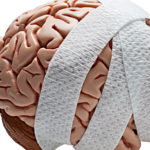
What happened to Hunter Wendelstadt never happens. Wendelstadt is a Major League baseball umpire who was working the plate during the Red Sox-Indians game Monday night. As the bottom of the sixth inning was about to start, Sox fireballer Joe Kelly was making his warm-up tosses. One of them sailed high and over catcher Christian Vasquez’ glove striking Wendelstadt in the face mask. The veteran ump dropped to the ground, his mask and hat taken off by the impact of Kelly’s throw. Obviously shaken up by getting hit in the head, the Indians team trainer came out to check on him. He asked him what was more than likely concussion protocol questions to determine if Wendelstadt should continue. The umpire lasted the half inning but left after the end of the sixth inning. He won’t return to the series between the Sox and Indians and is being treated for concussion-like symptoms.
Nowadays, most major professional sports have concussion protocols built into their policies. In the not too distant past, players would just continue after having their “bell rung” and sportscasters would praise their toughness. Unfortunately, those old attitudes led to permanently debilitating injuries ranging from blurred vision, migraine headaches to emotional problems such as rage and depression. It is only recently that concussions and traumatic brain injuries have been diagnosed and treated as serious life altering conditions. It’s understandable how this slow evolution took place in sports. A concussion or traumatic brain injury is rarely accompanied by outward, physical manifestations of trauma such as bleeding or broken bones. Such injuries can be hard to diagnose and difficult to treat. Athletes who’ve suffered from concussions and traumatic brain injury rarely make it back to top form and the recovery is slow and painful.
So, why am I discussing this? Non-athletes can suffer the same injuries in car accidents. The force of the impact of a car accident, even when the accident involves seemingly slow moving vehicles can be devastating. After the accident, many people wave off medical attention claiming they aren’t injured. However, these same people often suffer from the consequences of their decision to not seek medical attention.
Motor vehicle accidents and falls are responsible for most TBIs suffered by Americans. According to the Centers for Disease Control and Prevention, about 2 million Americans per year experience TBI, with 14.3% caused by traffic accidents and 40.5% caused by falls.
That means some 286,000 TBIs result from car crashes annually. The actual number may be much higher, because brain injuries aren’t always immediately obvious after an accident. Indeed, TBI is commonly referred to as a “silent” epidemic because many people do not associate brain injury with concussions—the most common form of TBI.
TBIs take two forms: open and closed. An open (or penetration) TBI occurs when a foreign object goes through the skull and enters the brain. A closed head injury, by contrast, is caused by a bump or blow to the head.
Closed head injuries are much more common than penetrating head injuries in crashes. They typically occur when the head strikes the windshield, dashboard or steering wheel.
Research indicates that even low-speed car accidents can result in mild brain trauma. Not only that, but mild TBI/concussions are increasingly recognized as a source of brain damage that can cause long-term problems with thinking and memory.
Even if you’re involved in a slow-speed fender bender, TBI—and a host of associated complications—can occur. Unfortunately, TBI symptoms may not be immediately obvious amidst the confusion and stress that follow an accident.
And, you don’t have to hit your head to suffer from a traumatic brain injury or a concussion. It can occur after an impact to your head or after a whiplash-type injury that causes your head and brain to shake quickly back and forth.
If you’ve been involved in any car accident, you should seek medical attention. You are most likely not qualified to self-diagnose. If you’ve suffered a concussion or a traumatic brain injury, immediate medical attention is necessary.
